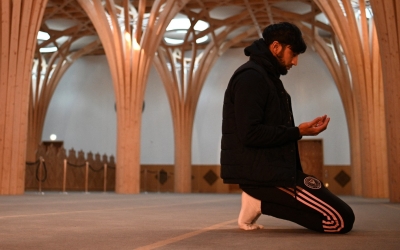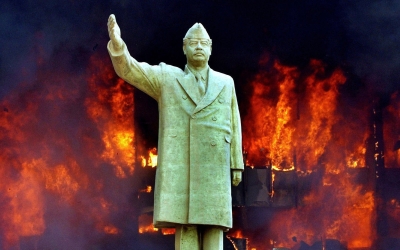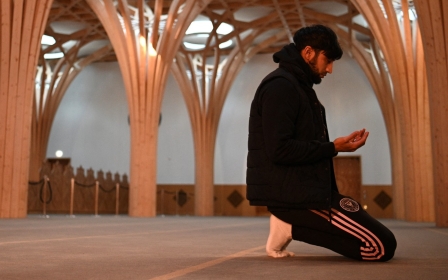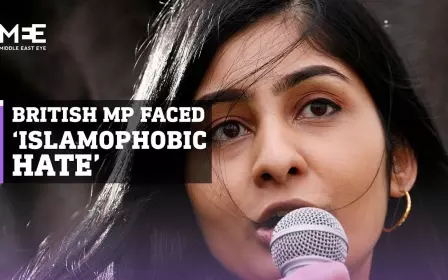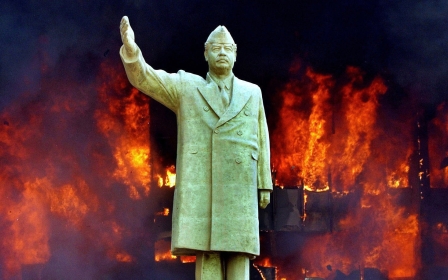UK: Anti-Islamic prejudice 'more likely' in upper and middle classes
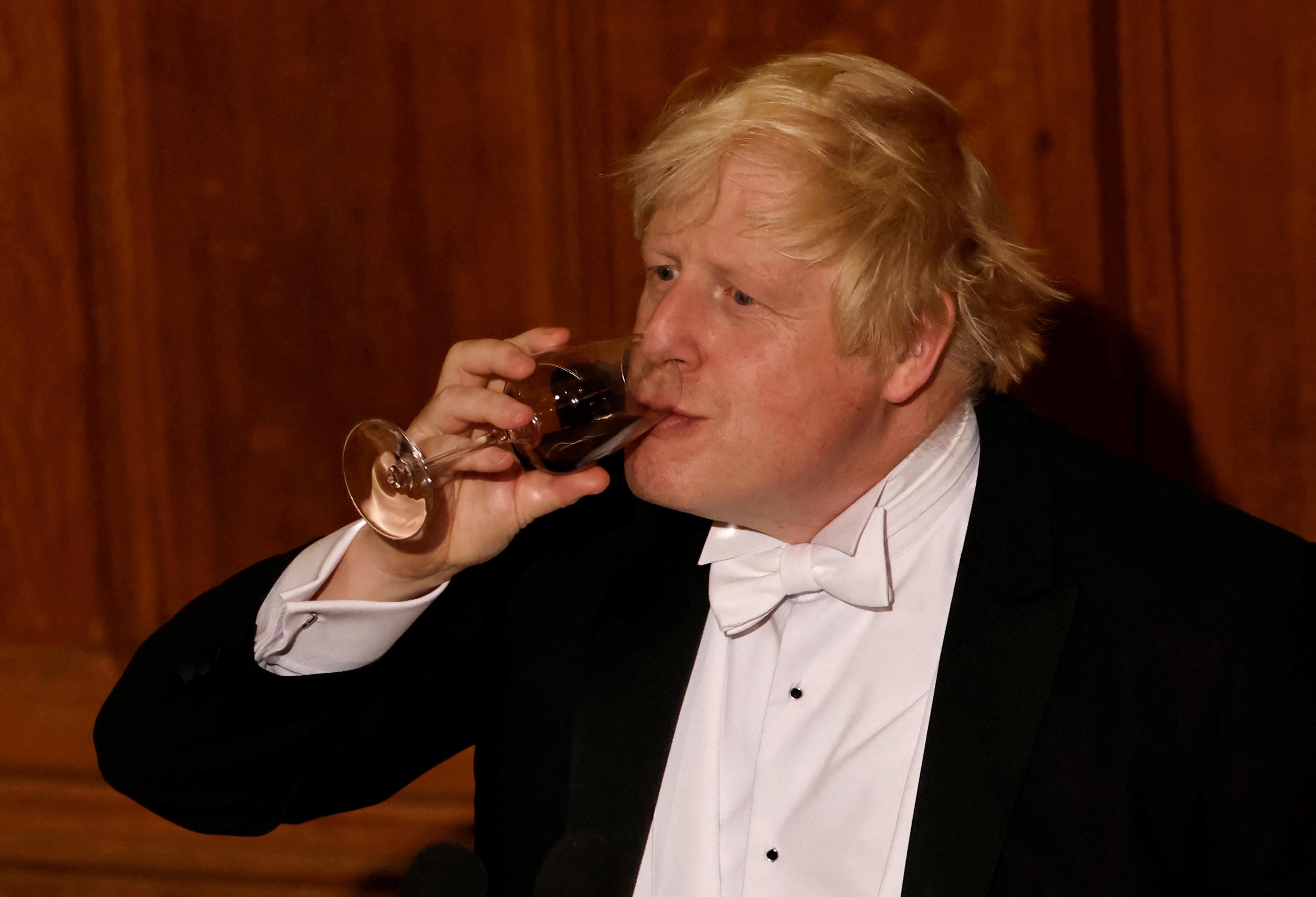
The lead author of a new survey on Islamophobia in the UK has told Middle East Eye that confronting anti-Muslim prejudice in Britain would involve asking difficult questions of the country's ruling elite, including Prime Minister Boris Johnson and Nadine Dorries, the culture secretary.
Stephen H Jones, lecturer at the University of Birmingham, said that Islamophobia is accepted and expressed in the upper echelons of British society in a way that racism against other groups - except Gypsy and Irish Travellers - is not.
Jones is the lead author of a survey conducted by the University of Birmingham, which found that British residents from middle and upper-class occupational groups are more likely to hold prejudiced views of Islam than those from working class occupational groups.
'The middle and upper classes feel more confident in their views and won't admit their ignorance. The more educated you are, the more miseducated you are'
– Stephen H Jones, University of Birmingham
Presented in a report titled, The Dinner Party Prejudice: Islamophobia in Contemporary Britain, the survey found that 23.2 percent of people from middle and upper class social groups (ABC1) hold prejudiced views about Islamic beliefs, compared with only 18.4 percent from working class groups (C2DE).
Carried out in conjunction with the polling company YouGov, the survey is based on the responses of 1,667 people to a list of 17 questions. It found that Muslims are the UK's second "least liked" group, after Gypsy and Irish travellers.
New MEE newsletter: Jerusalem Dispatch
Sign up to get the latest insights and analysis on Israel-Palestine, alongside Turkey Unpacked and other MEE newsletters
While the middle and upper classes held the highest levels of prejudice in relation to the religion of Islam and Islamic beliefs, it was older Britons, men, working-class people and Conservative and Leave voters that were found to be more consistently prejudiced about Muslim people.
Sharia 'no-go areas'
More than one in four of those who responded to the survey, and nearly half of Conservative voters, hold conspiratorial views about Sharia "no-go areas" - parts of Britain that "operate under Sharia law where non-Muslims are not able to enter".
The report found that the British public is nearly three times as likely to hold prejudiced views of Islam than they are of other religions.
It also found that British people are more confident in making judgements about Islam than they are about any other non-Christian religion, and that they are much more likely to make incorrect assumptions about it.
Stephen H Jones told Middle East Eye that the British public more readily expresses anti-Muslim and anti-Traveller racism than it does other kinds of prejudice.
"As far as the class division goes, it is a question of education," Jones said. "The middle and upper classes express more prejudiced views. They feel more confident in their views and won't admit their ignorance. The more educated you are, the more miseducated you are."
The survey found, for example, that 21 percent of the British public mistakenly believe the Quran must be read "totally literally".
By comparison, 7.5 percent thought this of Judaism and the Hebrew Bible, while 4.8 percent of it thought it for Christianity and the Bible.
Working-class respondents to the survey were happier to admit that they did not know about certain Islamic beliefs and practices.
"There were two questions where the upper and middle classes came out as more prejudiced," said Jones. "Irish Travellers and the religion of Islam."
Other people's racism
Jones told MEE he thought that there was a tendency on the behalf of Britain's ruling elite to "ventriloquise" their own racism: rather than express anti-Muslim views directly, they would instead portray the country's working class voters as racist.
In the UK's media, this discourse is often framed around voters in the Labour Party's former "Red Wall" heartlands in the Midlands and north of England.
Jones said that with Islamophobia, there is a "weight of public opinion that makes it difficult to address".
The Islamophobia present in the ruling Conservative Party, and across society more generally, means that addressing anti-Muslim prejudice would involve confronting the views held by a large number of prominent figures, including Johnson and Dorries.
Johnson has compared Muslim women who wear the burqa to "bank robbers" and "letterboxes", remarks that reportedly led to a "surge in anti-Muslim attacks".
Dorries, now the British minister responsible for the country's media, has a history of promoting far-right Islamophobic misinformation.
She has retweeted former English Defence League leader Tommy Robinson, shared conspiracy theories about "sex abusing" Muslim "grooming gangs", and called the burqa a "medieval costume" that should not be tolerated in "progressive countries".
'Manufactured ignorance'
Both the Conservatives and the Labour Party have recently faced detailed accusations of Islamophobia in their own ranks, with Tory MP Nusrat Ghani stating just yesterday that she was told her "Muslimness was an issue" at a meeting in Downing Street in 2020.
The University of Birmingham's report recommended that the British government and other public figures should "take steps to acknowledge and address the lack of social sanction Islamophobic discourses and practices trigger".
Part of this would involve addressing the "systemic miseducation about Islam" common in British society and, as the survey has found, most common in the middle and upper classes.
The United Kingdom, in the words of the eminent Black British scholar Paul Gilroy, tends to trade in a form of "manufactured ignorance" when it comes to its colonial history and present-day problems with racism.
Jones said that Islamophobia is "publicly accepted in a way that other forms of racism aren't. It attracts less public censure".
The only exception here is Gypsy and Irish Travellers, with the survey finding that a staggering 44.6 percent of the British public viewed this group negatively.
Jones told MEE that he hoped the survey could shift the way people react to their own prejudice.
He hopes British people might be able to see the holding of prejudice not as a moral failing that marks you out as a bad person, but as something that needs to be acknowledged and addressed - rather than deflected.
Middle East Eye delivers independent and unrivalled coverage and analysis of the Middle East, North Africa and beyond. To learn more about republishing this content and the associated fees, please fill out this form. More about MEE can be found here.


